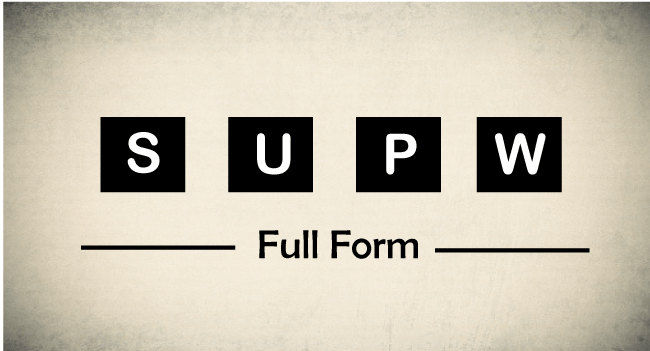What is the Full Form of SUPWSUPW: Socially Useful Productive WorkSUPW stands for Socially Useful Productive Work. It is described as considerable manual work and services that are important to society, the community, and children and have great significance for students. Such activity should not be carried out mechanically but rather with proper planning, research, and preparation at each level in order to be effective. The utilisation of better tools and resources where available, and the use of contemporary methodologies, will result in an appreciation of the necessities of a progressive society involving modern technology. With SUPW, students learn to collaborate as a team with skill and tact. 
It was launched in 1978 by the Ministry of Education to spread the Gandhian principles and educational thoughts of Mahatma Gandhi. The Ishwarbhai Patel Committee then named it the word 'SUPW', i.e., Socially Useful Productive Work. The Indian Ministry of Education first included SUPW in the school curriculum in 1978. In schools connected with the Council for the Indian School Certificate Examinations (CISCE), which administers the Indian Certificate of Secondary Education (ICSE) and the Indian School Certificate (ISC), SUPW is still an optional but essential component of the course curriculum. Also, some Central Board of Secondary Education (CBSE) institutions also help improve its quality. The Ishwarbhai Patel Committee defined Socially Useful Productive Work as purposeful, important, and useful manual work that will advance society. It is advantageous to the student because people will create a cohesive society with the aid of education and creativity. To create a progressive and better society, it must include current technology and procedures in the planning, preparation, implementation, and assessment of all socially linked activities. Science, work, humanity, and social harmony are the four essential pillars of SUPW. Discipline, humanity, secularism, equality, autonomy, and decentralisation are also the foundations of SUPW. The major goal of SUPW is to give kids access to both social and economic activities, so they can better grasp the scientific principles and applications that will either directly or indirectly affect their future chances and social environment. It also attempts to improve teamwork and positive thinking, as well as understanding and awareness of scientific technologies. Along with helping students develop their particular skills, SUPW also promotes community work among students, raises knowledge of scientific developments, and fosters the development of a scientific worldview. Students can address common neighbourhood issues with the knowledge they gain in the classroom. Objectives of SUPW
The Bottom LineThe term "SUPW" is referred to as "Socially Useful Productive Work", which attempts to expose kids to the outside world and other people. The student gains a grasp of the political, social, cultural, and economic demands of society, enabling themselves to contribute positively to those needs. This approach enables the learner to engage in some beneficial, original, and instructive curriculum activities. It is relevant at every level of life, including in terms of clothes, shelter, hygiene, and general health. It seeks to establish a strong connection between theoretical education and real-world social, economic, and cultural endeavours.
Next TopicFull Form
|
 For Videos Join Our Youtube Channel: Join Now
For Videos Join Our Youtube Channel: Join Now
Feedback
- Send your Feedback to [email protected]
Help Others, Please Share










